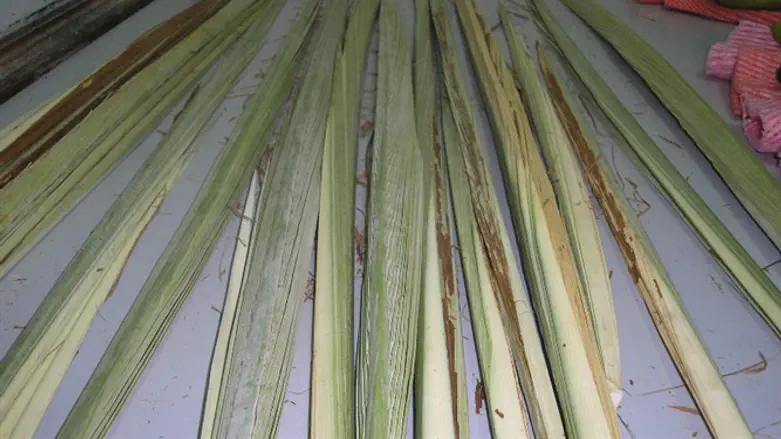
In coordination with the Gaza District Coordination Office (DCO) and the Defense Ministry's Crossings Authority, about 20,000 lulavs from the Gaza Strip were transferred to Israel for Sukkot, the Defense Ministry's spokesman said.
The lulav transfer to Israeli markets was coordinated by the representatives of the Agriculture Ministry in the District Coordination Office and PA representatives in Gaza and carried out through the Kerem Shalom crossing, the main crossing to and from the Gaza Strip.
Purchase of lulavs, perhaps like that of other Gazan goods, raises the question of how proper it is to abet Gazan agriculture, while at the same time funding Gaza's Hamas-controlled residents.Since we are dealing with lulavs the question also takes on an halakhic aspect, and for this reason Arutz Sheva raised the issue with Rabbi Baruch Efrati, head of the Young Rabbis Association called Derech Emunah.
"We must weigh much data and listen to the professionals describe the reality, and we need to hear from them whether purchasing these lulavs strengthen the enemy in the Gaza Strip or whether trading in them may cause them to deal less in terror and more in other things. The ones to decide this are the security services.These factors do not define commerce in lulavs as something that supports terrorism, and therefore it is difficult to say that the lulavim would be halakhically prohibited by purchase from the enemy, which is a mitzvah performed by way of committing an offense."
Rabbi Efrati adds: "It is possible to compare this to the commerce we do in the seventh year, when the Land is commanded to remain fallow, and in the seventh "Shemittah" year we make sure to buy produce of Otzar Beit Din or Heter Mechirah arrangements that allow commerce with this produce, while some of the religious and haredi public prefer to buy foreign crops.
"There is no doubt that this is a last resort, not the first choice, since the most preferable option is acquiring crops from Israeli farmers and strengthening settlement in the Land of Israel and our hold on it, but whoever buys fruits and vegetables from other places, Europe or elsewhere,is allowed to buy such crops as wll.Nevertheless, even though it seems that it is not prohibited, it is not a proper first choice to begin with."
Rabbi Efrati says: "When purchasing the Four Species it's more correct to buy from Jewish farmers in Eretz Yisrael, not only from the standpoint of sanctity of the fruits of the Land of Israel, but also for reasons of strengthening settlement. Rabbi Kook wrote many letters about the Etrogim - citrons - of the Land of Israel and the importance of buying crops from the Land, both because of the sanctity of the Land itself and the standpoint of strengthening settlement, and even from Torah lessons that relate simply to the crops of the Land of Israel.
"It is true that the obligation of the Torah is to perform a mitzvah that connects us to the Land of Israel and strengthens Jewish agriculture in the Land of Israel rather than strengthening the enemy in Gaza; this is true.Therefore, it is not possible to outright prohibit but it is more appropriate to purchase and buy from a Jewish farmer even if the lulav is a little less elegantly mehudar."
As for his initial statement that the experts, that is, members of the defense establishment, determine the definition of what constitutes danger, Rabbi Efrati was asked whether a question mark should be placed after these experts statements, since they often involve factors other than security, such as political, economic, or other considerations.
Rabbi Efrati replies: "It is possible that one can doubt the purity of their considerations or their legitimacy, but in general the Torah gave authority to define reality into the hands of professionals, doctors, or security personnel.
"If it was clear to us that the security forces and Shin Bet exaggeratedly claim we should trade with Gaza despite the risk, we certainly wouldn't accept it, but we have no such indication. The army and the Shin Bet are serious bodies, so the lulav can not be ruled out.Such a statement would be too far-reaching. But certainly not as a first choice, and preferably a regular kosher lulav from an Israeli farmer than a deluxe-kosher lulav from the Gaza Strip."
Rabbi Efrati ended by suggesting that everyone consider and ask himself what God wants. "One must ask what the Creator will be pleased with. Even if this is halachically permissible, the question is whether it is the best thing.It is not clear, even if the grower does not support terror, to say that God is happy about such a thing when it's possible to strengthen settlement in the Land of Israel would certainly not be true."